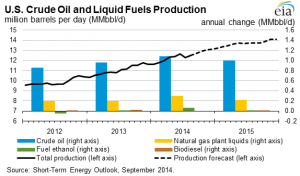
The next meeting of OPEC ministers is scheduled to take place November 27, 2014 in Vienna. It is not going to be business as usual. The stated purpose of the meeting is to set production policies for 2015. But we all know what the members will be discussing over tea or something stronger.
“How do we get this problem under control?”
A cartel is a group of companies or, in this case, countries who engage in collusion to limit or control the market price of a product. In many countries this behavior is illegal and those guilty of it are often stripped of their ‘ill-gotten gains’ in the form of fines or mandatory lower prices. In this case, the market itself has imposed its own corrective behavior by interfering with the ability of cartel members to control market supply. This market revenge has been rare, but when it does it sends a chill down the spine of every cartel member as cheers goes up as consumers refill their gas tank.
Oil like other commodities is traded in global markets at prices set based upon supply and demand. The Brent crude oil price is the benchmark for oil traded in world markets. In the United States, oil is benchmarked against the West Texas Intermediate (WTI) Crude Oil price pegged at Cushing, Oklahoma.
OPEC seeks to control the price of oil on global markets by actively managing the swing productive capacity of oil available at any time. On any day normal oil sales take place based upon traders perception of how much oil is available to meet expected world demand. When a supply disruption take place like a hurricane or a war or a fire at a critical oil facilities oil prices go up to factor in the risk premium. When things work “normally” oil trades is range that for years since the great recession has been between $100 to $115 per barrel. When bad things happen prices go up, but as the problem is resolved prices settle down again in the normal trading range.
Sometimes “stuff happens” to affect both the supply and demand side of the oil price calculus:
• Global economic growth has been weak in many parts of world since the end of the great recession. So when economic growth in China or the US or EU slows down it makes the market nervous that demand will soften pushing down prices.
• Oil supply disruption cause prices to spike when rebels overthrew Libyan dictator Muammar Gaddafi in that country, supply side disruptions have happened in Iraq, Nigeria and other places from conflicts. In Mexico, Venezuela, Iran supply has been reduced from sanctions or some lack of investment to keep up with technology.
• The Shale Revolution in the United States has resulted in substantial growth in oil and gas supply. This supply growth has reduced oil imports in the US to their lowest level in 29 years as a result of advanced technology including fracking..
• Demographics, Aging Populations and Changing Driving Patterns is also profoundly changing demand with more energy efficiency cars such as hybrids and PHEV, increase fuel efficiency standards, driving less, riding mass transit, and the aging of baby boomers and rise of Millennials both of whom are driving few miles.
But why the sudden drop in world oil prices?
Oil prices have been trending down since June 2014 because Libya and Iraq got their production act together and began producing again raising supplies. The US keeps on pumping more oil from shale and thus keeps importing less and less. Yes, but, you say—that does not explain the big drop.
The Dirty Little Secret about OPEC—-Cheating!
What changed is that Saudi Arabia decided it would not reduce its oil production levels if other OPEC members refused to do so. The dirty little secret of OPEC is the oil ministers would call a meeting and agree to cut in production targets to bring down supply levels enough to get the price back up to the level they wanted. Then the ministers would go home and cheat by hoping some other OPEC member would take the production cut medicine so they would not get sick.
Saudi Arabia has always provided the ‘adult supervision’ in OPEC because it had the capability to increase or decrease world swing productive capacity by dialing its own oil production up or down at will. So when the OPEC ministers cheated the Saudis would take the medicine itself—because it was in Saudi Arabia’s best interests to do so. Other OPEC members don’t care what Saudi Arabia does as long as it did not affect them.
But this time Saudi Arabia refused to take the medicine and instead told the world markets to get used to lower oil prices for a while. All those traders that bet oil prices in the future would rise (Contango) freaked out and sold their contracts driving down prices.
This is a game of OPEC Chicken.
It reminds the OPEC oil ministers that in addition to controlling world swing productive oil capacity Saudi Arabia also has the power to lower oil prices and take their market share the old fashioned way—–competition!
Oil prices probably won’t stay this low for too long, so enjoy it while it lasts—and expect more volatility—stuff happens, you know.
